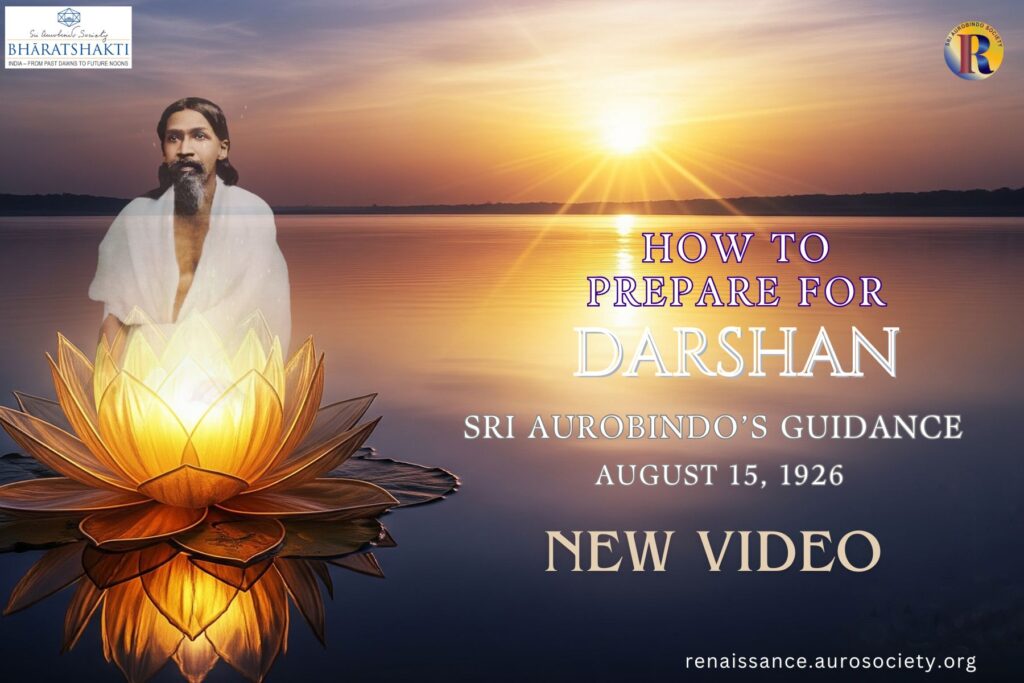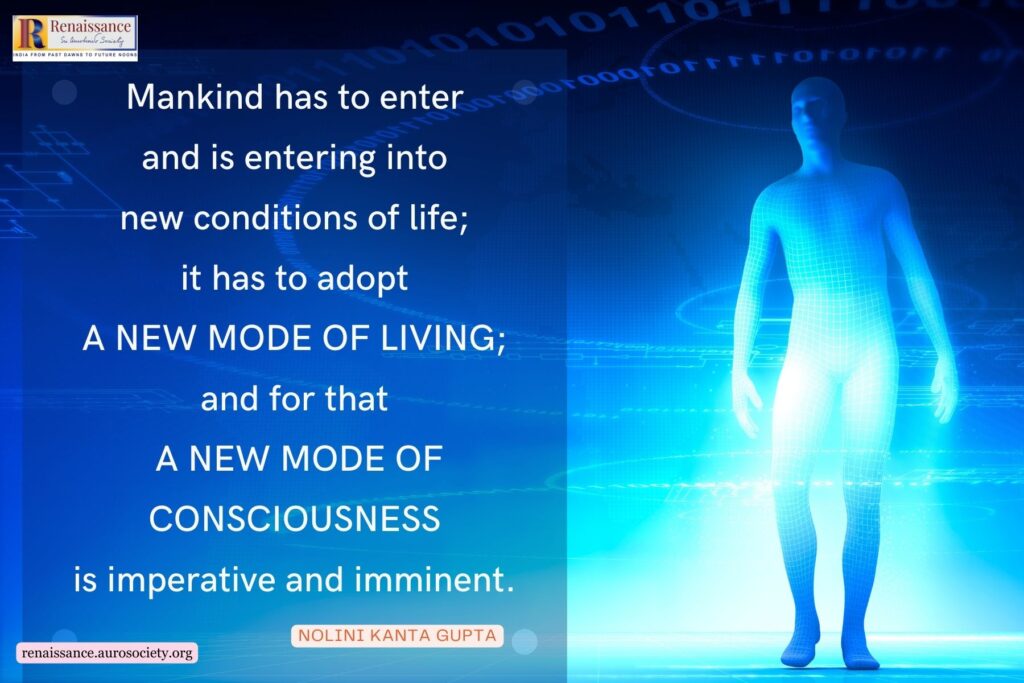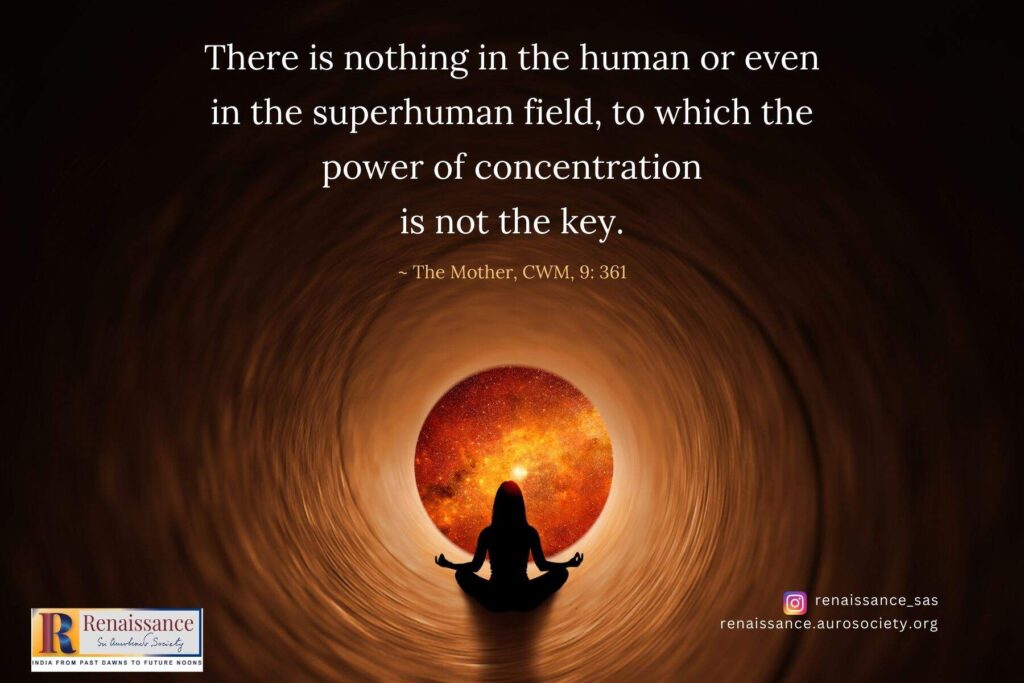Volume III, Issue 3
Author: The Mother
Editor’s note: Featuring a conversation of the Mother with some disciples and children on the topic of true courage. Dated 26th January, 1955, this talk is based upon the chapter titled ‘In Difficulty’ from the book Bases of Yoga. Using some interesting examples, the Mother explains that true courage is courage with the full knowledge of all the possibilities and is ready to face everything without exception. The editors have made some formatting changes like shortening a few paragraphs for easier online reading.

Question: Mother, if one is cowardly and avoids a difficulty, if next time the difficulty is still greater, then how long does this continue?
It continues until one stops being cowardly, till one understands that it’s not something to be done. One can overcome one’s cowardice. There isn’t a thing one can’t overcome if one wants to. [. . .]
. . . I think that one is cowardly because one is very tamasic and fears having to make an effort. In order not to be cowardly, one must make an effort, begin by an effort, and afterwards it becomes very interesting. But the best thing is to make the effort to overcome this kind of flight out of oneself. Instead of facing the thing, one recoils, runs away, turns one’s back and runs away. For the initial effort is difficult. And so, what prevents you from making an effort is the inert, ignorant nature.
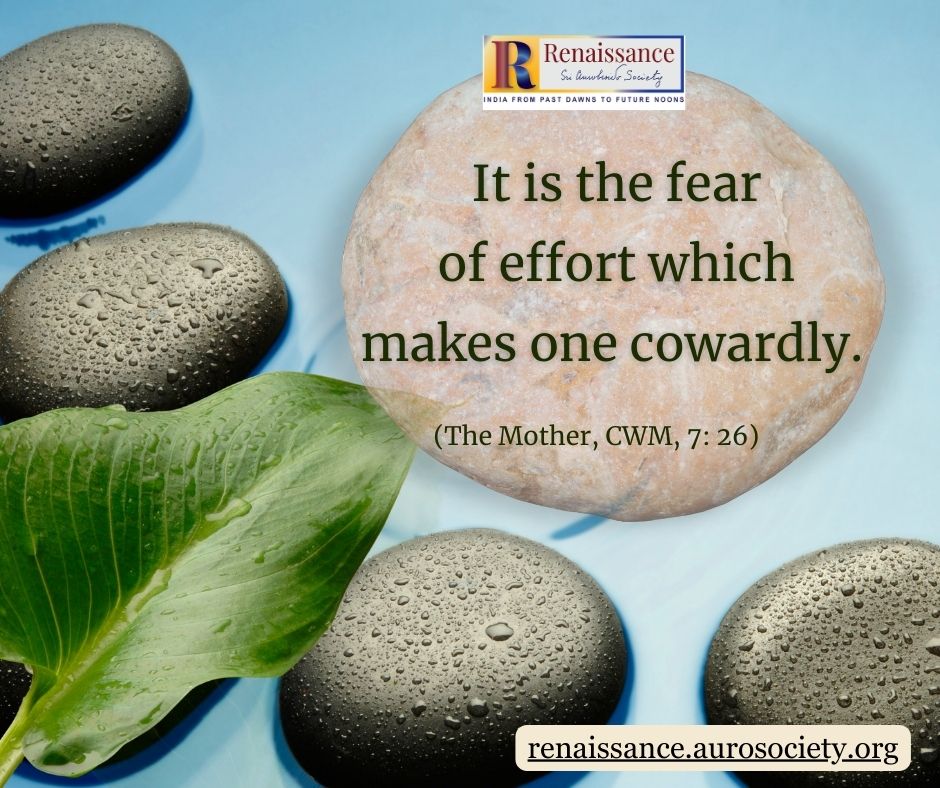
As soon as you enter the rajasic nature, you like effort.
And at least the one advantage of rajasic people is that they are courageous, whereas tamasic people are cowards. It is the fear of effort which makes one cowardly. For once you have started, once you have taken the decision and begun the effort, you are interested.
It is exactly the same thing which is the cause of some not liking to learn their lessons, not wanting to listen to the teacher; it is tamasic, it is to be asleep, it avoids the effort which must be made in order to catch the thing and then grasp it and keep it. It is half-somnolence. So it is the same thing physically, it is a somnolence of the being, an inertia.
There are people who… I have known people who were physically very courageous, and were very, very cowardly morally, because men are made of different parts. Their physical being can be active and courageous and their moral being cowardly. I have known the opposite also: I have known people who were inwardly very courageous and externally they were terrible cowards. But these have at least the advantage of having an inner will, and even when they tremble they compel themselves.
Once I was asked a question, a psychological question. It was put to me by a man who used to deal in wild animals. He had a menagerie, and he used to buy wild animals everywhere, in all countries where they are caught, in order to sell them again on the European market. He was an Austrian, I think. He had come to Paris, and he said to me,
“I have to deal with two kinds of tamers. I would like to know very much which of the two is more courageous. There are those who love animals very much, they love them so much that they enter the cage without the least idea that it could prove dangerous, as a friend enters a friend’s house, and they make them work, teach them how to do things, make them work without the slightest fear.
“I knew some who did not even have a whip in their hands; they went in and spoke with such friendliness to their animals that all went off well. This did not prevent their being eaten up one day. But still—this is one kind. The other sort are those who are so afraid before entering, that they tremble, you know, they become sick from that, usually. But they make an effort, they make a considerable moral effort, and without showing any fear they enter and make the animals work.”
Then he told me,
“I have heard two opinions: some say that it is much more courageous to overcome fear than not to have any fear…. Here’s the problem. So which of the two is truly courageous?”

There is perhaps a third kind, which is truly courageous, still more courageous than either of the two.
It is the one who is perfectly aware of the danger, who knows very well that one can’t trust these animals. The day they are in a particularly excited state they can very well jump on you treacherously. But that’s all the same to them. They go there for the joy of the work to be done, without questioning whether there will be an accident or not and in full quietude of mind, with all the necessary force and required consciousness in the body.
This indeed was the case of that man himself. He had so terrific a will that without a whip, simply by the persistence of his will, he made them do all that he wanted. But he knew very well that it was a dangerous profession. He had no illusions about it. He told me that he had learnt this work with a cat—a cat!
He was a man who, apart from his work as a trader in wild animals, was an artist. He loved to draw, loved painting, and he had a cat in his studio. And it was in this way that he began becoming interested in animals.
This cat was an extremely independent one, and had no sense of obedience. Well, he wanted to make a portrait of his cat. He put it on a chair and went to sit down at his easel. Frrr… the cat ran away. So he went to look for it, took it back, put it back on the chair without even raising his voice, without scolding it, without saying anything to it, without hurting it of course or striking it. He took it up and put it back on the chair.
Now, the cat became more and more clever. In the studio in some nooks there were canvasses, canvasses on which one paints, which were hidden and piled on one another, behind, in the corners. So the cat went and sat there behind them. It knew that its master would take some time to bring out all those canvasses and catch it; the man, quietly, took them out one by one, caught the cat and put it back in its place.
Also see:
Something of the stuff of the hero and of the titan
He told me that once from sunrise to sunset he did this without stopping. He did not eat, the cat did not eat (laughter), he did that the whole day through; at the end of the day it was conquered. When its master put it on the chair it remained there (laughter) and from that time onwards it never again tried to run away. Then he told himself, “Why not try the same thing with the bigger animals?” He tried and succeeded.
Of course he couldn’t take a lion in this way and put it on a chair, no, but he wanted to get them to make movements—silly ones, indeed, such as are made in circuses: putting their forefeet on a stool, or sitting down with all four paws together on a very small place, all kinds of stupid things, but still that’s the fashion, that’s what one likes to show; or perhaps to stand up like a dog on the hind legs; or even to roar—when a finger is held up before it, it begins to roar—you see, things like that, altogether stupid.
It would be much better to let the animals go round freely, that would be much more interesting. However, as I said, that’s the fashion.
But he managed this without any whipping, he never had a pistol in his pocket, and he went in there completely conscious that one day when they were not satisfied they could give him the decisive blow. But he did it quietly and with the same patience as with the cat. And when he delivered his animals—he gave his animals to the circuses, you see, to the tamers—they were wonderful.
Of course, those animals—all animals—feel it if one is afraid, even if one doesn’t show it. They feel it extraordinarily, with an instinct which human beings don’t have. They feel that you are afraid, your body produces a vibration which arouses an extremely unpleasant sensation in them.
If they are strong animals this makes them furious; if they are weak animals, this gives them a panic. But if you have no fear at all, you see, if you go with an absolute trustfulness, a great trust, if you go in a friendly way to them, you will see that they have no fear; they are not afraid, they do not fear you and don’t detest you; also, they are very trusting.
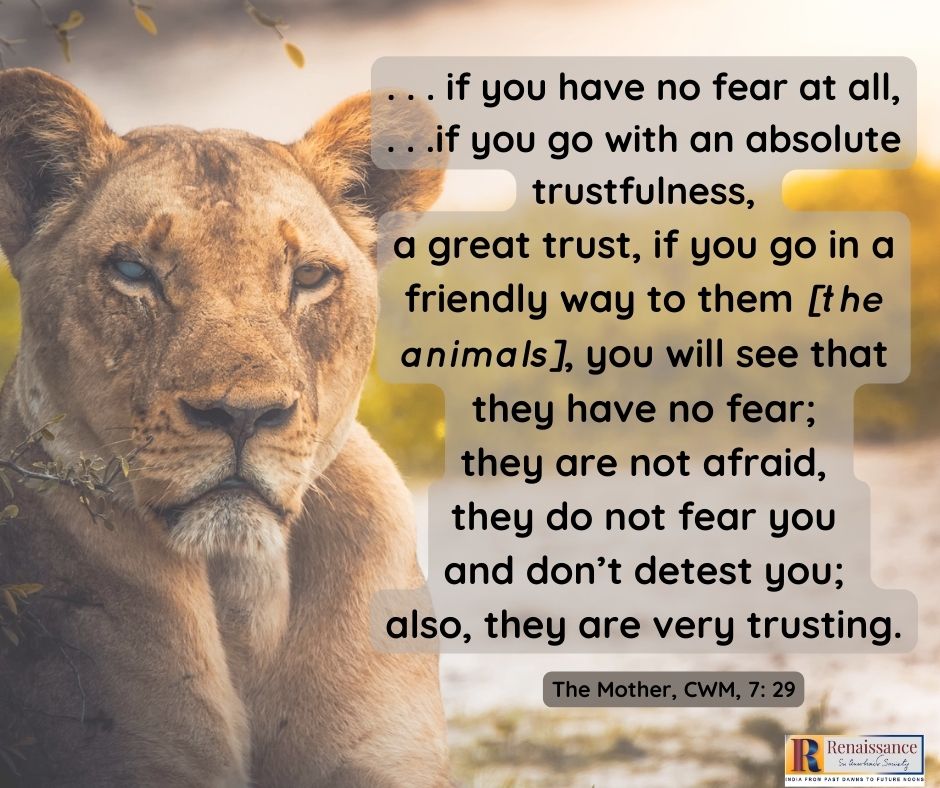
It is not to encourage you to enter the cages of all the lions you go to see, but still it is like that. When you meet a barking dog, if you are afraid, it will bite you, if you aren’t, it will go away. But you must really not be afraid, not only appear unafraid, because it is not the appearance but the vibration that counts. [. . .]
Sweet Mother, you didn’t say who is the most courageous?
I said it is a third kind who is the most courageous. Courage… it is courage in different places.
The one who is friendly with animals, who has no fear—this is because there is a great physical affinity between them, an intimacy for all kinds of reasons, you see, a spontaneous physical friendship. But we don’t know, if he suddenly awoke to a sense of danger whether he would keep up his courage. It is possible that he might lose it immediately.
On the other hand, the second one has no affinity with animals, and so he fears them. But within himself he has much courage and goodwill, a will and mental courage and perhaps a vital one, which make him master his bodily fear and act as though he were not afraid. But the fear is there in the body. Only he has controlled it. Now it is to be seen whether physical courage or moral courage is greater. One is not greater than the other; it is courage in different domains.
Some people move without a quiver in the midst of all dangers. They have physical courage.
Others… you see, during the wars a phenomenon occurred, we have all the study-cases possible. When the soldiers were in the trenches and were told to come out of their trench and go and occupy another, and they came out from the trench under enemy fire which was right in front of them… then naturally if you value your life in the least, you cannot but be afraid—if you set store by your life; or of course, there are some who could be fearless, but then they would be yogis.
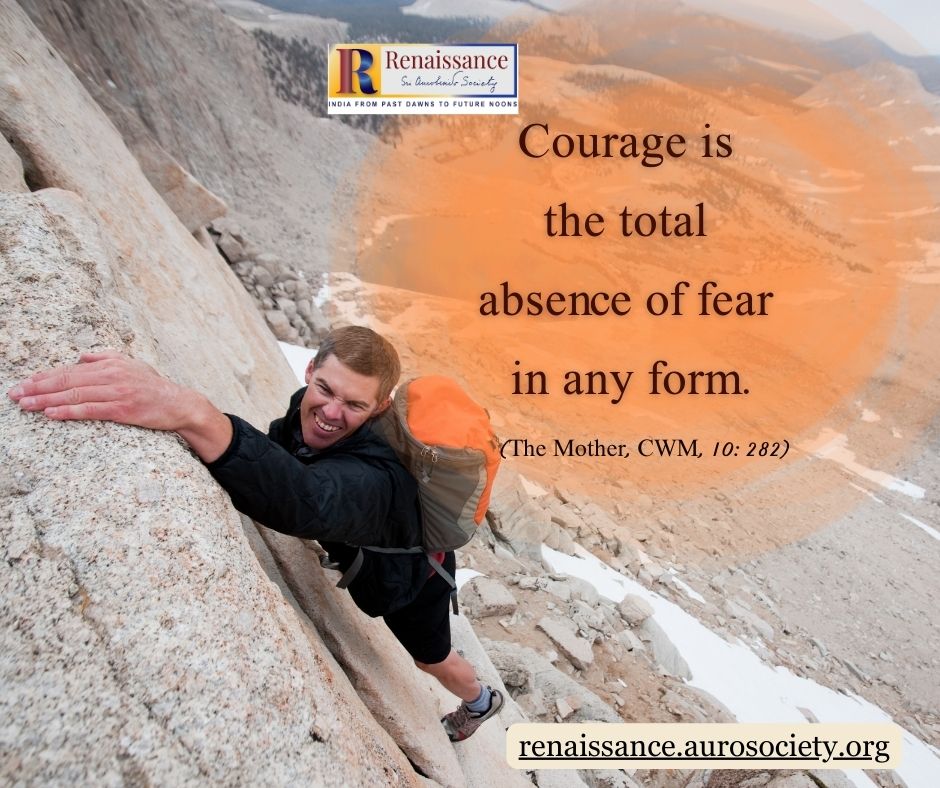
Usually soldiers are not yogis, they are ordinary people, because everyone becomes a soldier. In the olden days, a very long time ago, it was those who loved battle who became soldiers. But it is no longer so.
It is all the most peaceful poor devils who are taken and turned into soldiers, and everyone has to go in for it. So there isn’t one in a thousand who truly has the soldier’s temperament—surely not. The great majority are people made for the ordinary life in the ordinary way, those who like quietness, you see, to have their little hum-drum routine of life. They don’t feel they are warriors at all. Therefore, it is difficult to expect them to become heroes overnight.
However, as the officers have a pistol in their hands, and if not obeyed shoot one in the back, it is thought better to march on, you understand, than to be killed like a rat. There, the situation is like that. It is not very poetic but it is like that.
Well, some people, you see, fell literally ill with all this when they had to get out—ill, I can say, they had diarrhoea, they were absolutely ill. They had to get out all the same, and they did, and then sometimes on the way they were seized by a great courage in face of the real danger.
Others went out like a block of wood, without even knowing what was going to happen, completely stupefied by the intensity of the danger.
There were some who offered to go out when the order was not given to all, when it was a mission that had to be fulfilled; there were men who offered themselves. But these knew very well what could be awaiting them. And so, here, these were courageous people, but there weren’t many of them. There never are many.
Only, in the heat of action, when the atmosphere is at its utmost tension, there is a kind of collective suggestion which makes heroes of men for the time being. Afterwards it is finished, but at that moment one is heroic. But this of course is a collective suggestion.
True courage, in its deepest sense, is to be able to face everything, everything in life, from the smallest to the greatest things, from material things to those of the spirit, without a shudder, without physically… without the heart beginning to beat faster, without the nerves trembling or the slightest emotion in any part of the being.
Face everything with a constant consciousness of the divine Presence, with a total self-giving to the Divine, and the whole being unified in this will; then one can go forward in life, can face anything whatever. I say, without a shudder, without a vibration; this, you know, is the result of a long effort, unless one is born with a special grace, born like that. But this indeed is still more rare.

To overcome one’s fear means that there is one part of the being which is stronger than the other, and which has no fear and imposes its own intrepidity on the part which is afraid. But this doesn’t necessarily imply that one is more courageous than the one who has no fear to master.
Because the one who doesn’t have any fear to master… this means that he is courageous everywhere, in all the parts of his being.
Now, there is an intrepidity which comes from unconsciousness and ignorance. Children, for example, who do not know about dangers, you see, do things they would not do if they had the knowledge of this danger. This means that their intrepidity is an ignorant one.
But true courage is courage with the full knowledge of the thing, that is, it knows all the possibilities and is ready to face everything without exception.
~ The Mother, CWM, Vol. 7, pp. 23-31

~ Design: Beloo Mehra and Biswajita Mohapatra

